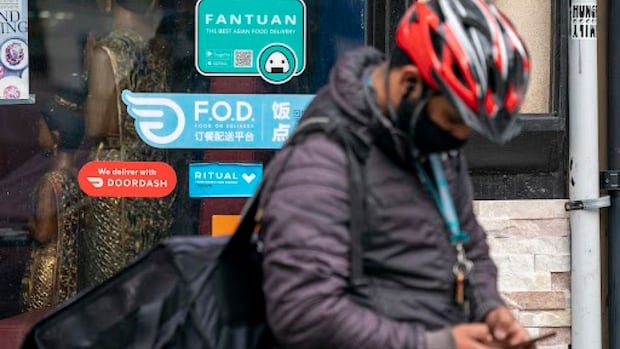[
New legislation that offers more protection to digital platform workers in Ontario becomes law on Tuesday, but critics say the act is “lacking” and falls short of what gig workers actually need.
Under the province’s Digital Platform Workers’ Rights Act (DPWRA), digital platform workers must be paid at least the minimum wage “for each work assignment performed by a worker.”
The act applies to ride share, delivery and courier services, such as Uber, Lyft and Instacart. Changes under the law include more transparency about how pay is calculated, how and when tips and gratuities are collected by operators as well as the establishment of regular pay periods.
Jennifer Scott, president of Gig Workers United, a Toronto-based union of gig workers, said the organization will have to see how the legislation is implemented. But she said the problem when it comes to gig workers is that there is engaged time, when they are actively working, and unengaged time, when they are waiting for an order, delivery or customer.
The right to a minimum wage applies only while gig workers are working, she said.
“This minimum wage isn’t a real minimum wage because it only applies to just a little over half the time that we’re at work,” Scott said.
According to a 2021 City of Toronto update to its 2019 vehicle-for-hire impact report, drivers spend about 40 per cent of their time waiting for a trip, about 48 per cent driving a passenger and about 12 per cent en-route to a pickup or waiting for a passenger at pickup.
Law ‘denies workers basic rights’: advocate
The new legislation also gives workers the right to file complaints with the Ontario Ministry of Labour. But Scott said it doesn’t give them the right to file complaints with the Ontario Labour Relations Board and that means they do not have the right to arbitration.

Scott said the legislation essentially means digital platform workers do not have the same rights and protections that other Ontario workers enjoy.
“It’s still lacking,” Scott said. “This legislation — really it denies workers basic rights and protections. It denies workers minimum wage for the entire time that we’re at work.”
The legislation also denies workers paid sick leave, statutory holiday pay, overtime, as well as the right to make Employment Insurance, Canada Pension Plan and Workplace Safety and Insurance Board contributions, Scott said.
Ontario says legislation establishes ‘enforceable’ rights
In a statement on Monday, the ministry said: “Ontario is proud to lead the country by introducing the Digital Platform Workers’ Rights Act (DPWRA), the first legislation of its kind to establish new enforceable rights and core protections for workers who provide ride-share, delivery, and courier services through the use of digital platforms.”
Under the legislation, corporations can be fined $15,000 for a first offence and up to $50,000 for a third or subsequent offence within three years. Individuals may be fined $250 for a first offence and up to $1,000 for repeated violations.
“In addition, operators will be prohibited from retaliating against workers for asserting their rights, filing complaints, or cooperating with investigations,” the ministry said.
Uber and Lyft did not respond to requests for comment.
‘The pie is only so big,’ Uber driver says
Earla Phillips is an Uber, Lyft and Hopp driver and co-founder and president of the Rideshare Drivers Association of Ontario, an organization that advocates for fairness for drivers. She thinks the law doesn’t reflect real concern by the government for workers.
For example, Phillips said the legislation doesn’t reflect a driver’s expenses or the fact that the work is precarious.
“With the continued flood of more workers signing up to do this kind of work, you’re degrading their little tiny cut of the pie that doesn’t continue to grow with that growing workforce,” Phillips said. “The pie is only so big. The pie is not growing in comparison to the amount of workers that are flooding onto gig work platforms.”

‘Step in the wrong direction,’ lawyer says
Ryan White, a labour and employment lawyer, said the legislation is far too late.
White said it doesn’t do enough to provide transparency, pay gig workers for all of the work they do or protect them when they are terminated. He said the law has been discussed since 2022 and the province has allowed the issue to “fester” for years.
“I think, if anything, the legislation is a step in the wrong direction in the sense that it gives the appearance that we’re doing something about the problem,” White said.
White said gig work is under-compensated, dangerous, difficult and important.
“This is legislation that allows the provincial government to say — ‘Look, we’re actually doing something about the problem’ — without actually taking adequate steps to ensure that gig workers are protected.”
Sundeep Mann, an Uber Eats driver, said he is not sure how the new rules for workers such as himself will actually help. He has been an Uber Eats driver for the past 18 months.
“I have no idea if it’s good or not because it depends on active time,” he said.
Mann said he won’t know if it’s made a difference for at least two weeks or a month.
